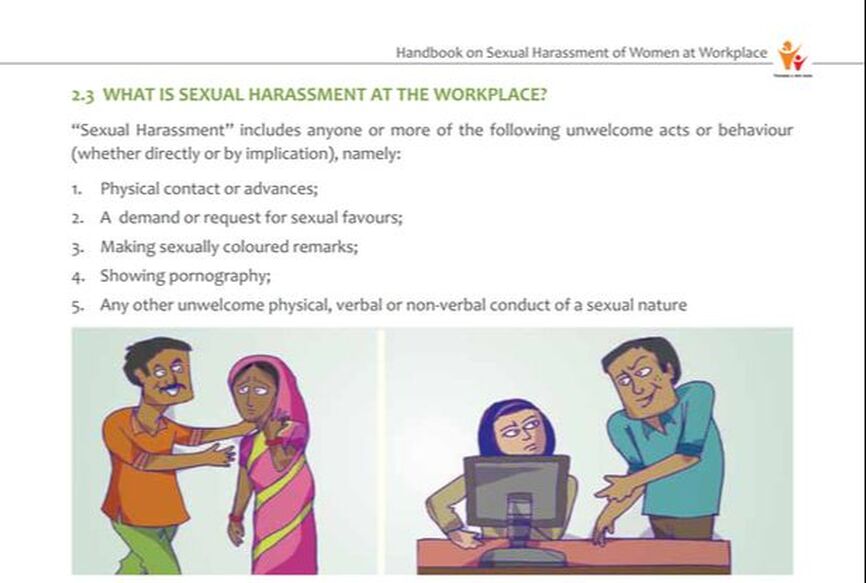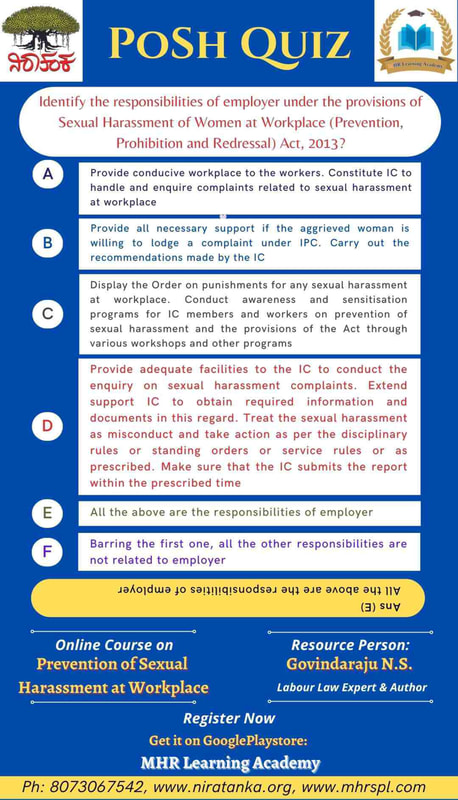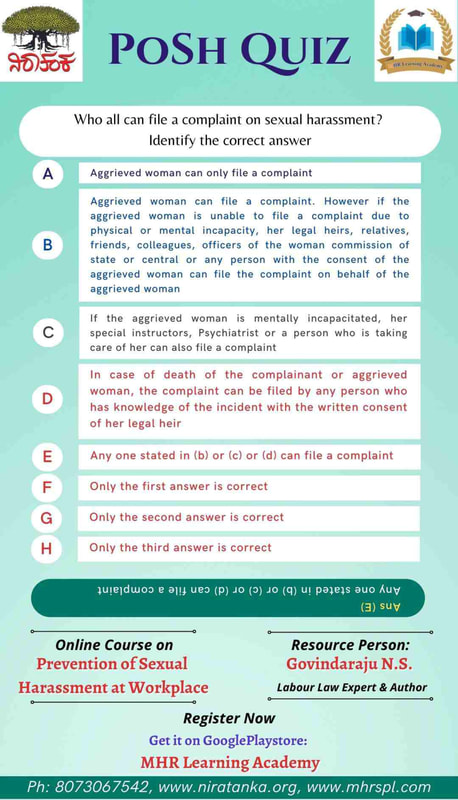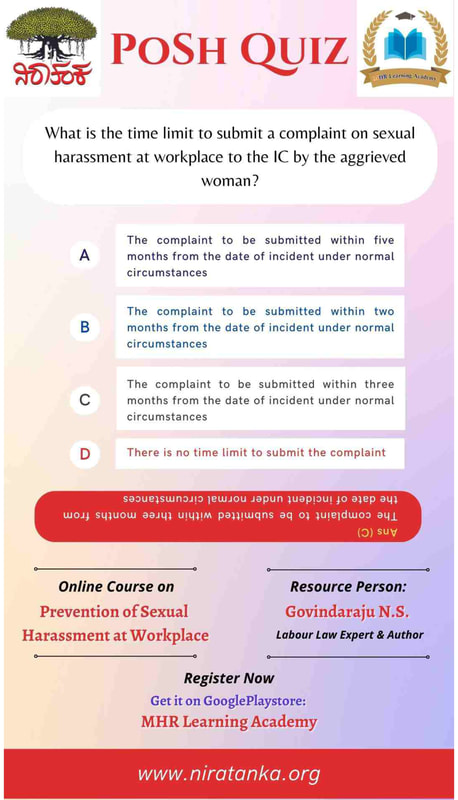|
The written complaint should contain a description of each incident(s). It should include relevant dates, timings and locations; name of the respondent(s); and the working relationship between the parties. A person designated to manage the workplace sexual harassment complaint is required to provide assistance in writing of the complaint if the complainant seeks it for any reason.
0 Comments
In case of any physical disability, anyone on her behalf, like her friend, relative, Member of State’s women’s Commission, can submit. Any mental disability, Complainant's relative OR friend, Special educator, Qualified psychiatrist or a psychologist, Guardian or authority under whose care she is receiving treatment or care, any person who has the knowledge of the incidence, can submit. And even in case of death, with the consent of the legal heir, any relative or friend can submit.
The aggrieved woman can file the compliant with any of the members of IC within a period of three months. If there is a delay, the IC members can make enquiries as to the reasons for delay and may condone the delay & accept the compliant.
The Employer is mandated to incorporate the acts of sexual harassment in the Standing orders, as per the amended provision under the Industrial Employment [ standing orders] Act, and also to incorporate under the service rules / policies of the Company.
A ‘person familiar with issues relating to women’ would mean such persons who have expertise in issues related to sexual harassment and may include any of the following:
• At least 5 years of experience as a social worker, working towards women’s empowerment and in particular, addressing workplace sexual harassment; • Familiarity with labour, service, civil or criminal law. WHAT ARE THE CONSEQUENCES IN CASE THE COMMITTEE IS NOT CONSTITUTED OR IMPROPERLY CONSTITUTED?3/2/2023
The Employer shall be liable for prosecution before the Court. For instance, this is one of the case.
The employee who had a fundamental right to a workplace free of sexual harassment, had complained about sexual harassment. According to the Court, had the organisation complied with the Vishaka Guidelines and set up such a Complaints Committee, the preventative benefit would have been three-fold: 1. Ensured a place where women employees could seek redress; 2. Sent a clear message to the workplace that such complaints would be enquired into by a specially designated committee with external expertise; 3. Prevented a series of litigation that followed.
Every employer is obliged to constitute an ICC through a written order. It is mandatory.
Committee shall consist of: Chairperson: Women working at senior level as employee; if not available then nominated from another office/units/ department/ workplace of the same employer. Two members [Min] : From amongst employees committed to the cause of women / having legal knowledge/experience in social work. Member: From amongst NGO/associations committed to the cause of women or a person familiar with the issue of Sexual Harassment Provided one half of the members must be women.
1. Create and communicate a detailed policy;
2. Ensure awareness and orientation on the issue; 3. Constitute Complaints Committee/s in every workplace and district so that every working woman is provided with a mechanism for redress of her complaint(s); 4. Ensure Complaints Committees are trained in both skill and capacity; 5. Prepare an annual report and report to the respective state government;
State Governments will notify a District Magistrate/Additional District Magistrate/ Collector/Deputy Collector as a District Officer at the local level. The District Officer will be responsible for carrying out the powers and functions under the Act at the district levels (including every block, taluka, tehsil, ward, and municipality).
Sec.19:
a. Shall provide a safe working environment at the workplace~ which shall include safety from the persons coming into contact at the workplace. b. Display at any conspicuous place in the workplace, the penal consequences of sexual harassments; and the order constituting. the Internal Committee. c. Organise workshops and awareness programmes at regular intervals for sensitising the employees with the provisions of the Act and orientation programmes for the members of the internal Committee in the manner as may be prescribed.
1. The head of the department, organisation, undertaking, establishment, enterprise, institution, office, branch or unit of the Appropriate Government or local authority or such officer specified in this behalf.
2. Any person (whether contractual or not) responsible for the management, supervision and control of a designated workplace not covered under clause (i). 3. A person or a household who employs or benefits from the employment of domestic worker or women employees
It also includes all workplaces whether owned by Indian or foreign company having a place of work in India. As per the Act, workplace includes:
The Act recognizes the right of every woman to a safe and secure workplace environment irrespective of her age or employment/work status. Hence, the right of all women working or visiting any workplace whether in the capacity of regular, temporary, adhoc, or daily wages basis is protected under the Act.
It includes all women whether engaged directly or through an agent including a contractor, with or without the knowledge of the principal employer. They may be working for remuneration, on a voluntary basis or otherwise. Their terms of employment can be express or implied. Further, she could be a co-worker, a contract worker, probationer, trainee, apprentice, or called by any other such name. The Act also covers a woman, who is working in a dwelling place or house.
Article 14: Right to Equality.
Article 16: Right to equal opportunities in employment Article 19 [1][g] Freedom to practice any profession or to carry out any occupation, trade or business Article 21: Right to life Article 51 A [ a] It is the duty of every citizen to abide by the Constitution & respect its ideals & institution Article 51 A [e] : State shall denounce the practices that are derogatory to the dignity of woman
A safe workplace is a woman’s legal right. Indeed, the Constitutional doctrine of equality and personal liberty is contained in Articles 14, 15 and 21 of the Indian Constitution. These articles ensure a person’s right to equal protection under the law, to live a life free from discrimination on any ground and to protection of life and personal liberty. This is further reinforced by the UN Convention on the Elimination of all Forms of Discrimination against Women (CEDAW), which was adopted by the UN General Assembly in 1979 and which is ratified by India. Often described as an international bill of rights for women, it calls for the equality of women and men.
Nirathanka has conducted a Training Programme on the Prevention of Sexual Harassment at Arco Lab Private Limited, jigani Bengaluru, on 9th, 10th & 11th of February 2023. Around 1000 Employees participated in the training program, which was well received.
Source:
Handbook on Sexual Harassment of Women at Workplace (Prevention, Prohibition and Redressal) Act 2013 Government of India Ministry of Women and Child Development November 2015 Dr. G.P. Naik Principal Consultant, Talent Avenues, Bangalore Even though the concept of sexual harassment is as old as the history of mankind, its implication at the work place has received attention in recent times. In fact until the verdict in Vishaka Vs. State of Rajasthan (1997) case by the Supreme Court of India in 1997, there were no official guidelines to deal with the subject. The case relates to an alleged gang rape of a social worker in a village of Rajasthan. In this case the court opined that sexual harassment at work place amounts to violation of individual rights guaranteed under Article 14 (equality before law); 15 (prohibition of discrimination on the ground of sex,); 19 (right to practice freely any profession, trade or occupation); 42 (provision for humane conditions of work), and the citizens duties under Article 51A to renounce practices derogatory to the dignity of women.
|
Categories
All
Prevention of Sexual Harassment at Workplace (PoSH)50,000 HR PROFESSIONALS ARE CONNECTED THROUGH OUR NIRATHANKA HR GROUPS.
YOU CAN ALSO JOIN AND PARTICIPATE IN OUR GROUP DISCUSSIONS. |
||||||















 RSS Feed
RSS Feed





